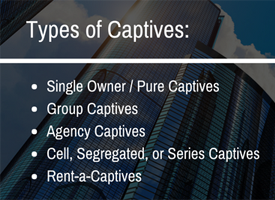A captive is an insurance company that has been specifically formed to cover risks of an affiliated or parent business. More mid-market businesses owners are forming their own captives to thwart risk and create better financial efficiency within their businesses. There are various types of captive insurance companies currently available. The video below explains.
Single-Owner Captives / Pure Captives
Single-owner captives afford insureds many ownership benefits, including:
- insuring the losses of a subsidiary or affiliated company
- benefiting from tax-deductible premiums
- customized coverages
- control over premium reserves
- certainty of payment by the insurer for bona fide claims
- And secured loans and dividends in certain circumstances
Group Captives
These types of captives are owned by multiple, non-related organizations (policyholders). The captive is usually sponsored by a trade group such as homebuilders, franchisees, group medical practices or hospitals, or other professional or industrial groups.
The group captive usually insures a narrow range of coverages common to the particular trade or industry. Some examples are general liability for road builders, health or disability for lawyers, and professional liability for architects.
 A business establishes a "single owner captive" to insure its own risks and the risks of its subsidiaries and affiliates.
A business establishes a "single owner captive" to insure its own risks and the risks of its subsidiaries and affiliates.
These types of captive insurance companies are owned by insurance brokers or agents and insure some portion of the insurance sold by its agency or broker shareholders.
The captive receives a share of all premiums written and pays a portion of claims. Agency captives are typically used as a cost-effective means to write insurance for their clients or to allow an agency to participate in the underwriting profits.
Cell Captives, Segregated Cell Captives
These types of captives are entities that are divided up into “cells,” legally kept separate from each other. Cell captives offer a way for smaller companies to share captives without larger expenses of an autonomous large captive.
These captives allow insureds to gain the benefits of captive insurance without the burden of forming their own stand-alone captive insurance company.
Cell captives can be risky alternatives to single-owner captives because the captive owner’s capital may be exposed to unknown financial risks from the insureds of the other cells. Incomplete legal documentation, a lack of corporate and legal oversight, and the potential of mixing of funds between the cell and the larger entities are all potential pitfalls of these types of captive insurance companies.
Rent-A-Captives
These captives are pre-established entities that insure the risks of unrelated parties for a fee.
Having the right captive structure in place gives you control over your risk management and ensures your captive remains in good standing.
Captive planning requires the expertise of professionals who understand the legal, tax, and regulatory requirements to form a captive—this includes knowing what types of captive insurance companies are most appropriate for their clients.
Partnering with a captive management with expertise on the various types of captives ensures you’ll get the most out of your captive program.
Working with Capstone Associated Services, Ltd.
For over 25 years, Capstone Associated Services, Ltd. has supported mid-market businesses in forming their own single-owner captive insurance companies in collaboration with lawyers, insurance professionals and certified accountants. We have a proven track record for standing with our clients in the design, implementation, and ongoing management of their captive programs.
Capstone leverages an award-winning, multi-disciplinary team approach and supports clients throughout the life of the captive. For one turnkey fee, Capstone manages the expertise of all the players needed to analyze, design and implement an appropriate alternative risk strategy for your business.
Capstone is a standout in the industry with over 25 years in operation. Unlike most other 831(b) captive managers, the team has the expertise design, implement, and manage your captive company and provide full support. Capstone's staff of insurance professionals includes CPCUs (Chartered Property & Casualty Underwriters), accountants and administrators.
Capstone has successfully formed over 200 since 1998, offering an award-winning captive insurance planning program that is unmatched in the industry. Our experts keep clients informed every step of the way.
For a free consultation, call us at 713.800.0550 or fill out our contact form. We’re looking forward to connecting with you.




